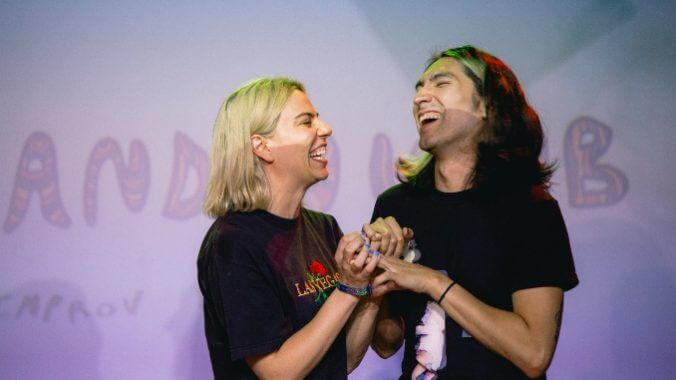Brooklyn Comedy Collective’s Fun and Dumb Festival Wants You to Love NYC Improv—But Not Take It Seriously
Photo Credit: Human Flower Productions
When the Del Close Marathon moved to LA in 2019, the New York City improv scene dramatically shifted. Also known as the DCM, the festival was famous for putting on three days of nonstop shows, allowing performers to explore virtually any improv form they could think of, from your typical Harold to “Springsteen Prov.” But the festival had been based in NYC since its inception in 1999, and its transfer across the country left a massive hole in the local improv scene. No longer was there a singular event that brought together the best (and/or most determined) improvisers in New York. The city’s improv community felt more disjointed than ever.
At the Brooklyn Comedy Collective, an alternative comedy teaching and performance space in Williamsburg, that shift didn’t go unnoticed. Helmed by Philip Markle, artistic director and co-founder; Maya Sharma, programming director; and Julian Hernandez, managing director, the theater had been working to grow its own programming. It was Hernandez, according to Markle, who, a few years after the DCM left New York, “came up with the idea of just, like, you know, there’s no improv festivals, the UCB closed in New York—what if we did our own?”
That original what-if has since grown into BCC’s Fun and Dumb Improv Festival, which just concluded its second year. And compared to the inaugural festival, this year’s event was massive. “Everyone went full send,” comedian Will Braithwaite, who performed the musical improv show The Brothers Braithwaite with—surprise—brother Owen Braithwaite on Saturday night, told me. “I saw so many faces at 2 am on Friday night and 11 am the next morning, ready to inhale another 12 hours of improvised madness.”
The 2023 festival saw a turnout two to three times bigger than 2022, according to Markle, and another day was added to the schedule, expanding the event’s length from three days to four. Luckily, the collective opened a third performance space last year to give its constantly increasing pool of student comedians more chances to perform. “It feels like the community at the theater has tripled,” performer Chloe Troast shared. “I think everyone’s like, ‘Wow, this is becoming a true institution now.’”
This year’s festival managed to draw audiences daily—not always a common sight at comedy shows, let alone big events. “You might do an improv show for, like, two people,” Kelly Cooper, a festival performer, explained. “But at least, in my experience, I felt like every show had a solid crowd.” I found that to be true when attending, regardless of the show’s subject, location, or timing. Audience members welcomed the experience of sitting in a basement or in front of a stage at all hours of the day, uncertain whether the next show would be worth missing other plans or even sleep for. And they weren’t tame crowds either; often, I would enter a room mid-show to find an audience raucously laughing, actively engaged with the ridiculousness in front of them. “The crowds are, like, insane; they’re so electric, so it’s just, like, feeding off of that,” said Wilfredo Diaz, a comedian who took part in the festival. “I’m just like, you know… having fun and being fucking dumb.”
Though the Fun and Dumb Festival was born in the wake of the DMC move, BCC had no desire to replicate the famous festival. Instead, it came up with something all its own. Rooted deeply in the collective’s desires to strengthen its community and revel in comedic passion without expectations or limits, improvisers were encouraged to take themselves seriously, but not their performances. “Improv to us is at its most free and fun when it is loose, and stupid, and just, like, not taking itself too seriously,” said Markle.
-

-

-

-

-

-

-

-

-

-

-

-

-

-

-

-

-

-

-

-

-

-

-

-

-

-

-

-

-

-

-

-

-

-

-

-

-

-

-

-








































